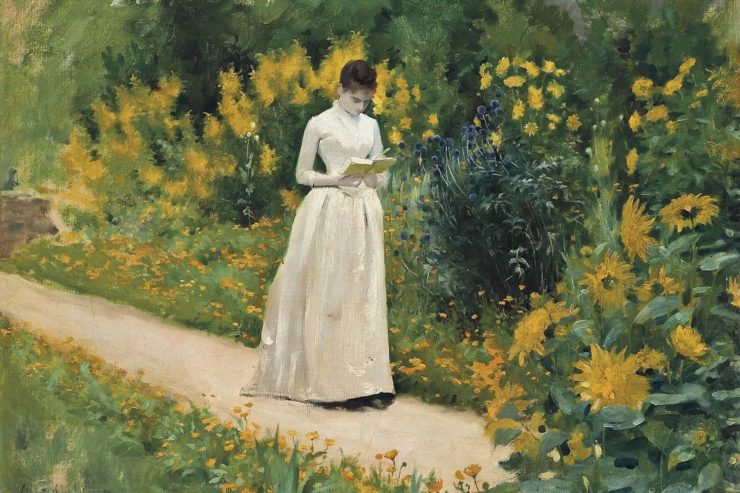Last week, there was a heat wave in Portland. I won’t tell you the numbers, because everyone has their own idea of “absurdly hot,” and their own threshold for what is a bearable temperature in which to leave the house. Suffice it to say that it was too hot. It was the kind of hot that you can feel even when you’re in a blissfully air-conditioned home. It presses down, it muddles, it limits. I couldn’t figure out why I was so irritable about it—irrationally irritated—until I realized something so basic that I felt foolish for not having grasped it before.
If it’s that hot, I can’t walk. If I can’t walk, I get fussy and can’t focus on reading. And if I’m not reading, I’m not writing.
This is a long way of saying that there was no new column last week because it was too hot, but also of getting at the way these things—moving, and sitting, and thinking; walking, and reading, and writing—are inextricably linked.
I’ve written before about walking and books, but from a different perspective: Walking as one of the hobbies I picked up from fantasy novels. Someone rightly corrected me, then, for saying that I never did a sport: walking, or hiking, is a sport, but I did not understand that when I was younger. I lived with someone who scorned hiking, and I thought it required a big production: Camelbaks, fancy sticks, maybe terrible things happening to one’s feet. (I blame the 1990s Eco-Challenge TV series for that last one.) I didn’t understand that when I wandered cities, getting lost on purpose, I was essentially hiking, in an urban sense. I didn’t know that when I wandered in the woods as a kid, that was hiking too.
I didn’t know that the thing I do when my brain stalls out is, well, hike. For the last year or so I’ve been meeting up with a friend to walk in Forest Park once a week. We walk up a hill and back down again; we talk about all kinds of things, including but not limited to books and writing, and I’m almost willing to bet that if I went back and looked at which weeks we didn’t walk, and which weeks I didn’t have a new column, there would be some relationship between the two things.
While it was hot, I didn’t read, either. I fussed, I searched for koroks in Hyrule (and cursed the fact that one blasted sign guy still eludes me), I caught up on the previous season of Harley Quinn, I watched Reservation Dogs, and I thought about rewatching Rebels. I did anything that did not require sustained thought. It is almost as if my brain is a generator of some sort, one fed by steps. Did you get your steps today? Does your mind remember how to form sentences? It’s like a sideways version of being hangry, except I’m unsettled and blank instead of crankily desperate for a burrito.
When it comes to walking and thinking, I’m not saying anything science doesn’t already know. A 2014 New Yorker article by Ferris Jabr gets technical about what happens to one’s brain while walking, but also says, “When we choose a path through a city or forest, our brain must survey the surrounding environment, construct a mental map of the world, settle on a way forward, and translate that plan into a series of footsteps. Likewise, writing forces the brain to review its own landscape, plot a course through that mental terrain, and transcribe the resulting trail of thoughts by guiding the hands.”
When I read this the first time, I misread it as “Walking forces the brain to review its own landscape.” I kind of think it works either way.
Walking and reading are less linked, unless you want some slightly goofy pieces about how to read while walking, which I have certainly done (but only with mass market paperbacks, which are small enough to see around). But it only makes sense—at least to me—that if writers are following a “trail of thoughts” that following our own trails might put us in the right brainspace to read. I walk, and the ground is laid for my thoughts to wander into a book.
Walking has a rhythm; prose has its own rhythms. Pace, tempo, the way your heart might race as you turn pages faster in a thrilling part—there are plenty of parallels to be drawn, some more of a stretch than others. Everything has a rhythm, you might say. But we find the similarities in the things we love; we knit those similarities into a day, a week, a life of enjoyment and curiosity. I walk to understand places, to see what grows in them, to remind myself to look up at the gargoyles on rooftops, down at the dirt, out at the crows and pigeons and starlings that fill the skies. The other week I went to see Explosions in the Sky play outdoors, and at the soaring peak of a dynamic song I do not know the name of, dozens upon dozens of crows began streaking across the pink sky, heading to their downtown roots. These things had nothing to do with each other, technically. But they flew the same paths into my mind, and now they walk—or fly—together.
When the heat broke, I read Daniel Abraham’s Blade of Dream in two days, wandering the streets of Kithamar in a rush but trying to saunter, to step back and savor the carefully mapped territory his thoughts created. The books in the Kithamar trilogy take place over a year, but this one, now, is all crisp heat and slow-moving feet. It snows in that book. I’m almost certain of it. But I can only see the dust and the sunlight on city stones and a glinting river. It’s a summer book, for me. (A certain kind of reader might get inspired to read each of the book’s sections in its proper season. But that person would have much greater patience than I.)
Have you gone outside today? Have you let yourself walk into what you’re reading or writing about? What shared paths are waiting to be found?














